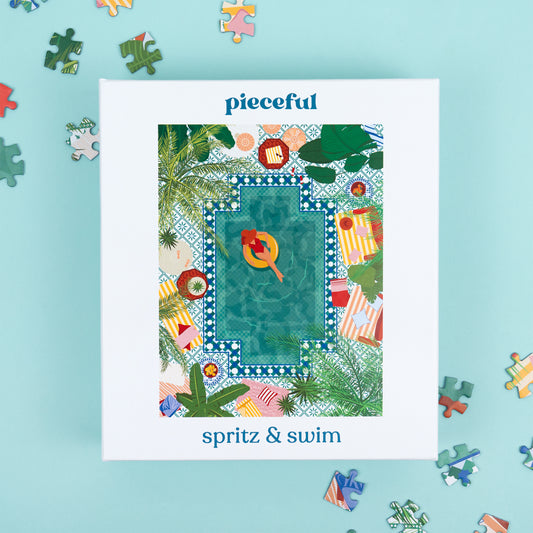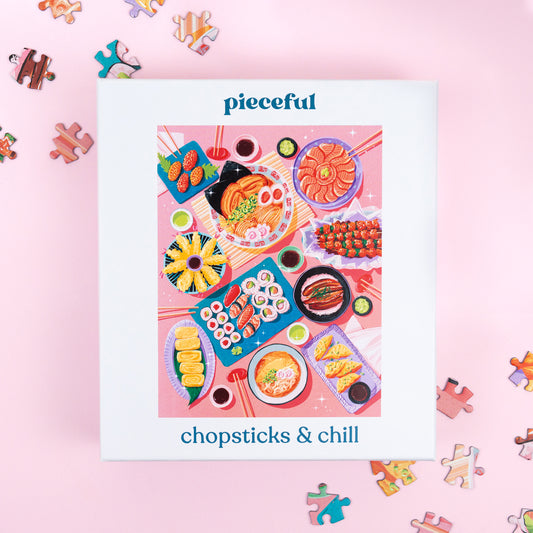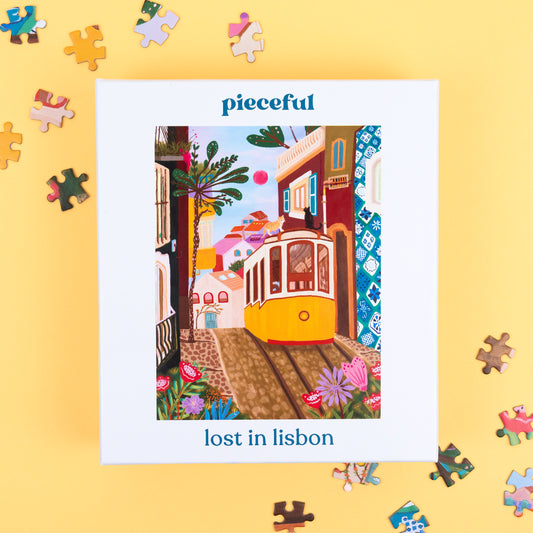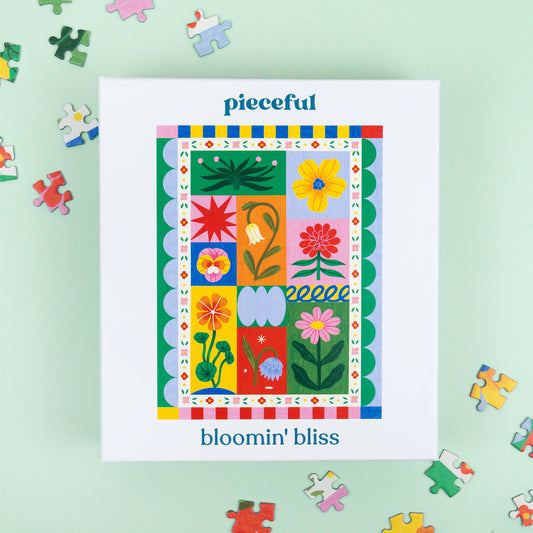let’s be honest: most of us weren’t taught how to enjoy puzzles. we either loved them as kids or felt frustrated, like we weren’t "good enough" to bother. but here’s the thing, puzzles were never meant to be a test. they’re not about speed, competition, or being "clever". they’re about presence. a small, mindful act of putting the world back in order, one satisfying piece at a time.
✨if you’ve ever said “i’m not a puzzle person”, this guide is for you. we’ll explore how puzzles can shift from a frustrating pastime to a deeply calming, screen-free ritual. whether you're brand new or returning after years, there’s something beautiful waiting in those little pieces. explore the art of mindful puzzling, where every puzzle is designed to bring calm, focus, and joy to your everyday moments.
you don’t need to be good at puzzles to enjoy them. in fact, taking away the pressure to be "good" is often the first step to discovering the real joy of puzzling. it’s not about performance; it’s about slowing down, being present, and feeling calm.
puzzling is more emotional than logical
puzzling isn’t just a mental exercise; it’s a way of gently processing the day. it gives your hands something to do while your thoughts begin to settle. even when it seems like a purely visual task, the real connection comes from how it makes you feel: present, focused, and quietly accomplished.
you don’t need to approach a puzzle like a challenge. instead, try viewing it like a good book: something you return to slowly, savouring each step. there’s a unique joy in putting in a single piece and watching the bigger picture take shape. that’s not logic, it’s art, intuition, and mindfulness.

a gentle antidote to everyday stress
when life feels chaotic, puzzling becomes a small act of order. it offers clarity without demands, focus without burnout. sitting with a puzzle forces your mind to stop jumping between tasks. you’re no longer thinking about notifications or tomorrow’s to-dos, just colours, shapes, and the quiet satisfaction of progress.
even ten minutes of puzzling can bring your stress levels down. and over time, it becomes a ritual, your body and mind start to crave: a moment of stillness you can return to whenever the world feels loud.
looking for a deeper understanding of how puzzles benefit your mental well-being? read our science-backed guide: are jigsaw puzzles good for the brain? here's what science says.
how to enjoy puzzling even if you're a total beginner
starting something new can feel intimidating, but puzzles are wonderfully forgiving. you don’t need special skills, just a bit of curiosity. here are three small ways to begin puzzling with confidence and ease.
1. choose a puzzle that speaks to you
your first puzzle shouldn’t feel like a chore. choose an image that inspires you, something warm, beautiful, or meaningful. Landscapes, soft illustrations, or abstract shapes are all great for beginners. what matters is that you’re drawn to it emotionally, not just logically. a 500-piece puzzle is ideal for getting started. it’s enough to be satisfying, but not so much that you’ll feel lost. at pieceful, we design puzzles specifically to be soothing and engaging, so you can ease into the experience with confidence. need help picking your first one? check out our curated beautiful jigsaw puzzle collection.
2. create a cosy space that welcomes focus
the physical environment where you puzzle makes a huge difference. think soft lighting, a warm drink, background music, or silence, whatever makes you feel safe and centred. your puzzle nook doesn’t need to be fancy; it just needs to feel like a space where you can breathe. creating this atmosphere signals to your brain that it’s time to shift gears. you're not in task mode anymore, you're in ritual mode. over time, just sitting at your puzzle spot will start to bring a sense of calm.
3. let go of the outcome (seriously)
this can’t be said enough: you do not need to finish your puzzle quickly. or at all. it’s okay to leave it out for days, weeks, even. come back to it when you feel called. the beauty is in the doing, not the finishing. some days you’ll find five pieces. other days, none. that’s part of the rhythm. it’s not about success or speed. it’s about giving your brain a kind, quiet place to land.
how puzzles support mindfulness and well-being.
more than just a hobby, puzzles are a wellness tool. they offer a calming focus and a rare sense of physical and mental balance. here’s how they help us feel more present, less stressed, and more in tune with ourselves.
they engage your senses and centre your focus
when we talk about mindfulness, we often think of sitting still and clearing our minds. but puzzles offer an active form of mindfulness. your fingers move. your eyes scan. your thoughts narrow in on colours and shapes. you become fully absorbed in the now.
this kind of gentle focus has measurable benefits: lowered heart rate, better concentration, improved emotional regulation. it also feels good. puzzling grounds you in your body and surroundings in a way that few modern activities can.
screen-free rituals are the new self-care.
we know by now that too much screen time makes us anxious, restless, and disconnected. but stepping away isn’t always easy. that’s why physical, absorbing activities like puzzles are so powerful: they pull you into something real, tactile, and rewarding. puzzling helps shift your nervous system from “fight or flight” to “rest and digest.” and it’s not just theory; many of our customers say puzzling has helped them sleep better, think clearly, and even reconnect with their creativity. for more screen-free inspiration, explore our best mindfulness activities that aren't meditation.
what to do when puzzling feels “too hard”
it’s completely normal to feel stuck sometimes. puzzles are designed to challenge you, but that challenge doesn’t have to feel frustrating. here are three ways to reset your approach when you hit a wall.
1. break it down (literally)
start small. Sort the edge pieces. then group by colour or pattern. work on one area at a time. there’s no shame in simplifying; it actually helps train your brain to focus and problem-solve without stress. and if you hit a block? leave it. walk away. let your subconscious do the work. you’ll be surprised how often the answer appears the moment you return.
2. puzzle with a friend (or solo with snacks)
puzzling doesn’t have to be solitary. invite a friend for a low-pressure evening with tea and tunes. chat while you piece together corners. or, keep it solo and treat it like a date with yourself. add chocolate. maybe a blanket. let it feel indulgent. some of the most beautiful puzzle moments happen when you’re not even talking, just existing quietly alongside someone you care about.
3. remind yourself: it’s meant to be a challenge
if you never struggled, it wouldn’t feel as satisfying. those tricky bits are where the magic happens. they stretch your patience, your attention, and your ability to keep showing up for yourself. think of puzzling as gentle resilience training. each stuck moment is an invitation to slow down, breathe, and trust yourself. you’re building more than a picture, you’re building inner calm.
make it a ritual, not a resolution
you don’t need to treat puzzling like a productivity goal. in fact, the more ritualistic and relaxed your approach, the more benefits you’ll notice. puzzling isn’t something to cross off a list, it’s something to savour. the power of puzzling really unfolds when it becomes part of your rhythm. a few minutes after work. a slow weekend morning. a Friday night swap for doomscrolling. the more you return to your puzzle, the more your nervous system learns to relax there.
it doesn’t have to be every day. even once a week can help reset your brain and body. what matters is that you come back to it with intention. that’s where the peace lives. want more ways to unplug intentionally? browse our digital detox guide for more mindful, tech-free rituals.
ready to start puzzling?
whether you’re new to puzzling or simply returning to it with fresh eyes, remember: this isn’t about being good. it’s about feeling good. with every piece you place, you’re creating something beautiful, and giving yourself the gift of presence.
discover the joy of slowing down with our calming jigsaw puzzles. each piece brings a moment of peace, helping you unwind, refocus, and reconnect. embrace the soothing ritual of puzzling and find your mindful escape in every puzzle you complete.

faqs
what if i don’t have the patience for puzzles?
start with short sessions, even 10 minutes can help. over time, puzzling becomes less about "finishing" and more about enjoying the present moment. you may begin by placing just a few pieces, but as your mind adjusts to the slower pace, you’ll likely find yourself naturally extending your puzzle time.
what’s the best puzzle size for beginners?
a 500-piece puzzle strikes a perfect balance between engagement and ease. it offers just enough complexity to feel rewarding without becoming overwhelming.
can puzzles help with anxiety or stress?
yes, absolutely. puzzles invite your mind into a focused, meditative state, gently pulling you away from intrusive thoughts or anxious loops.
are jigsaw puzzles good for the brain?
yes. jigsaw puzzles support spatial reasoning, short-term memory, and pattern recognition. they stimulate multiple areas of the brain simultaneously, keeping it engaged and adaptable.
do i need any special tools or a puzzle mat?
No. while puzzle mats or trays can help if you want to pause and move your puzzle, they’re entirely optional. all you truly need is a clean, flat surface with decent lighting and perhaps a tray or box lid for sorting pieces.
what makes pieceful puzzles different?
pieceful puzzles are designed with mindfulness and wellness in mind. from the artwork to the tactile feel of the pieces, every detail is curated to create a soothing experience.





